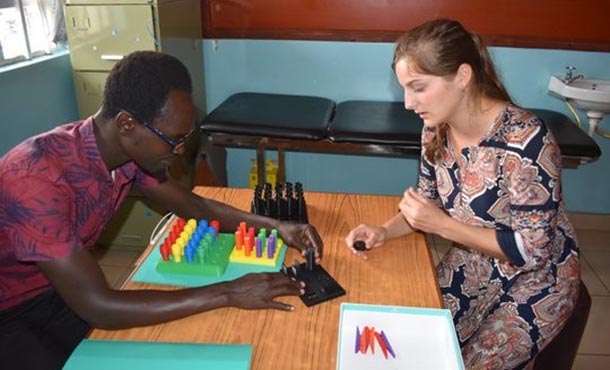
Lucy Spicher works with a 3D-printed peg board with a worker from Lumumba Hospital in Kisumu County, Kenya. IMAGE: LUCY SPICHER
Engineering undergrad brings research impacts to Kenya
Lucy Spicher, recipient of the 2020 Karadis Award for Research Achievement, pursues mechanical and biomedical engineering to build custom biodevices
2/28/2020
By Erin Cassidy Hendrick
UNIVERSITY PARK, Pa. — When Lucy Spicher first saw her mother’s wireless insulin pod, it was an emotional experience.
“My mom had been diagnosed with type 1 diabetes for 12 years before she got one of those pumps,” she said. “It was such a small device, but it was revolutionary for my family.”
The technology wirelessly delivers insulin into a patient’s bloodstream through a pod that adheres to the skin like a Band-Aid, better emulating the natural process of a healthy pancreas.
According to Spicher, her mom is now able to manage her blood sugar more effectively, which gives them more freedom to travel and spend time together as a family.
While seeing her mother helped by this biodevice was eye-opening on a personal level, Spicher’s interest in the pod went even further.
“I actually took one apart out of curiosity and thought to myself, ‘Wow, this is what I want to do with my life, make things like this,’” she said.
That inquisitiveness eventually became a navigation beacon for her education. At Penn State, she now pursues a dual major in mechanical (ME) and biomedical engineering (BME). While she initially thought she would pursue a career in medicine, she found the combined program in the College of Engineering to be the perfect fit.
“It’s such a unique program,” she said. “You can stand at the center of both BME and ME and it opens up so many opportunities I would not have had otherwise.”
One of those occasions was being recognized as the 2020 recipient of the Dr. John P. Karidis Department Head’s Award for Research Achievement in Mechanical Engineering.
“Earning the award was a really big honor,” Spicher said. “My research experience hasn’t been typical, so I was really surprised.”
As a student in the Schreyer Honors College, she pursued a research opportunity with Kijenzi, a 3D-printing startup founded in the Humanitarian Engineering and Social Entrepreneurship (HESE) program housed within the School of Engineering Design, Technology, and Professional Programs (SEDTAPP).
While she may not have been conducting research in a traditional laboratory setting on campus, Spicher’s work enhanced not only her education, but also her passion to create impactful medical devices. At Kijenzi, a dedicated team of engineers work to provide 3D-printed solutions to provide necessary medical supplies in remote regions of Africa.
Kijenzi operates an office in Kisumu, Kenya, where Spicher spent the summer of 2019. Her honors thesis project with the startup is focused on the utility and desirability of 3D-printed occupational therapy tools, like sensory stimulation cubes for patients with autism, or peg boards that help enhance fine motor skills.
“I’m able to be an independent expert on the work I’m doing, I have so much ownership over my part of the occupational therapy project,” she said.
The impact she could have on this path became clear when Kijenzi received a request for an emergency splint while Spicher was working in Kisumu.
“An infant had burned his hands and he needed a splint to hold two of his fingers open after he had surgery, so the skin didn’t fuse together,” she said.
Soon after the call, she rushed to the local hospital and met with the patient and his family. After taking measurements, she created a design, 3D-printed a splint and delivered it to the patient’s doctors within a day. Before Kijenzi, a custom, affordable solution to this problem would have been out of reach.
“That I was able to help an injured infant, save his family from going through multiple surgeries and see the immediate impact of my work was really rewarding,” Spicher said.
Drawing on this experience with Kijenzi and her early fascination with her mother’s wireless insulin pod, Spicher now envisions a career path in biodevices. Being able to fully immerse herself in the field during her undergraduate career isn’t something she expected, but one she is thankful for.
“I know I want to continue on with my research, probably by getting my doctorate,” she said. “I’ve had so many impactful mentors in academia and seeing everything they have been able to do in that career path is really telling.”
Whether it is bringing new knowledge to aid humanitarian causes in Kenya or finding ways to help people closer to home, Spicher is inspired to continue on her path.
“There are so many things I can do with my degree,” she said. “I want to give back and make sure I’m using my skills to impact people’s lives.”



